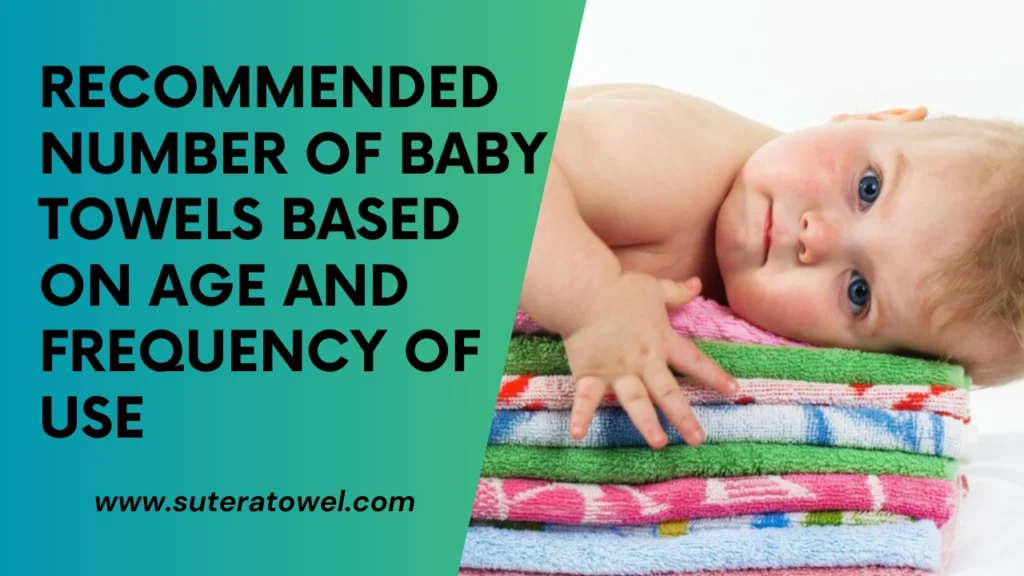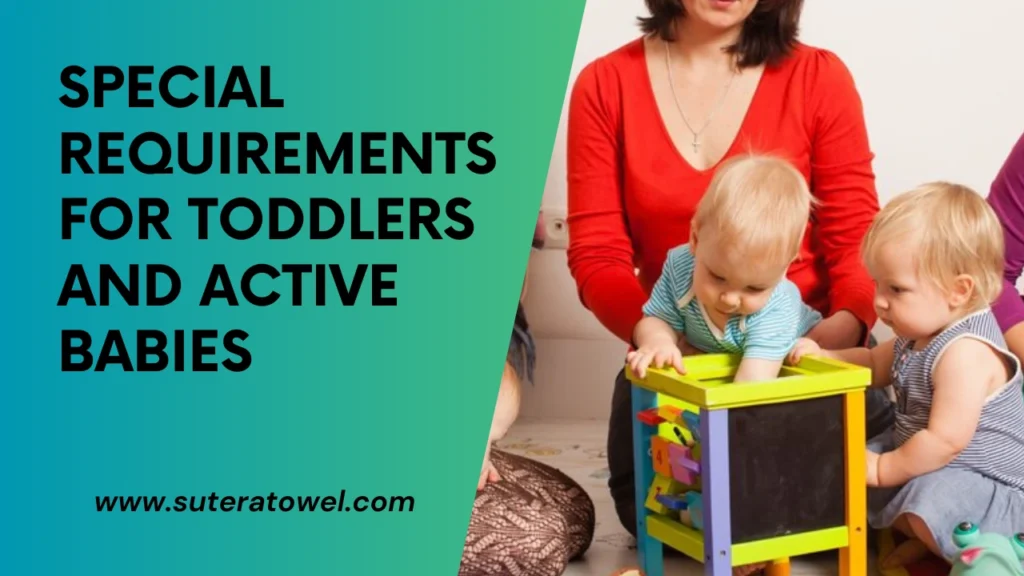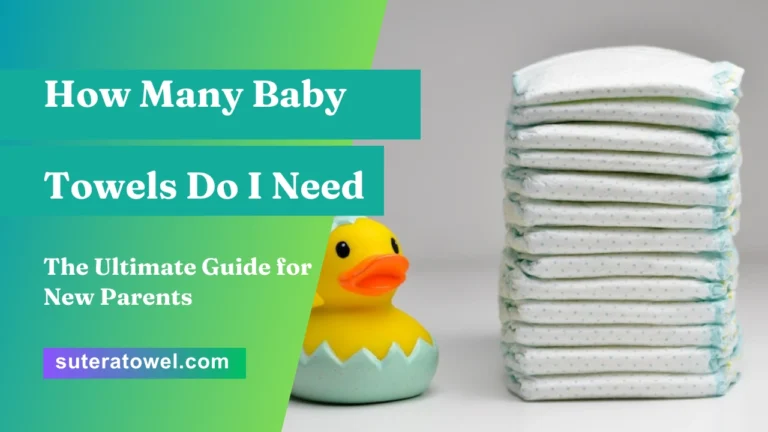When it comes to how many baby towels you need, it depends on your specific needs and preferences. However, it is generally recommended to have at least 6-8 baby towels on hand.
This allows for regular use, as well as giving you some extras in case of accidents or laundry delays. Additionally, having a few different types of towels, such as hooded towels or larger bath towels, can also be useful for different purposes.
By having an adequate number of baby towels, you can ensure that your little one stays clean, dry, and comfortable at all times. Remember to choose towels that are soft, absorbent, and gentle on your baby’s skin.
- 1 Understanding The Importance Of Baby Towels
- 2 Factors To Consider When Determining The Number Of Baby Towels
- 3 Recommended Number Of Baby Towels Based On Age And Frequency Of Use
- 4 Additional Considerations For Newborns
- 5 Special Requirements For Toddlers And Active Babies
- 6 Tips For Maintaining Baby Towels
- 7 Frequently Asked Questions For How Many Baby Towels Do I Need
- 8 Conclusion
Understanding The Importance Of Baby Towels

Understanding the importance of baby towels is essential for new parents as they navigate the world of baby care. Knowing how many baby towels you need ensures you are always prepared for those messy moments and can provide the comfort and cleanliness your baby deserves.
Softness and comfort for delicate skin:
- Baby towels are specifically designed to be gentle on a baby’s delicate skin.
- They are made from soft and plush materials that provide a cozy and comfortable feel for your little one.
- The softness helps to prevent any discomfort or irritation caused by rough fabrics.
Absorbency for quick drying:
- Baby towels are highly absorbent, allowing for quick and efficient drying after bath time.
- The absorbent nature of these towels helps to remove excess moisture from your baby’s skin, helping to prevent irritation and diaper rash.
- With their quick-drying properties, baby towels also reduce the risk of your baby catching a chill after bathing.
Hygiene and reducing the risk of skin infections:
- Baby towels play an important role in maintaining good hygiene for your little one.
- These towels help to remove any bacteria or dirt from your baby’s skin, reducing the risk of skin infections.
- By using clean and dedicated baby towels, you can prevent the transfer of germs from other household items.
Baby towels are not just ordinary bath accessories. They provide softness and comfort for delicate skin, while also offering absorbency for quick drying. Additionally, using dedicated baby towels promotes hygiene and reduces the risk of skin infections. By understanding the importance of baby towels, you can ensure that your little one stays clean, comfortable, and protected after every bath.
Factors To Consider When Determining The Number Of Baby Towels
Determining the number of baby towels requires considering factors such as how frequently they are used, the baby’s age, and personal preference. By evaluating these aspects, you can ensure you have an adequate amount of baby towels to meet your needs.
Babies require a lot of care, and ensuring that you have an adequate supply of towels is essential for their hygiene and comfort. When deciding how many baby towels you need, there are several factors to consider. Let’s explore these factors in more detail:
Frequency Of Use
- How often do you plan on bathing your baby? Taking into account how frequently you’ll be washing your little one will help you determine the number of towels you need.
- Do you also plan to use towels for other purposes, such as wiping spills or using them during diaper changes? If so, you might need to factor in additional towels to accommodate these uses.
Age And Stage Of Your Baby
- Newborns may not require as many towels, as they typically only need sponge baths in the initial weeks. However, as your baby grows older and starts to take regular baths, you will need more towels to ensure a fresh and clean experience.
- Keep in mind that older babies might require extra towels, especially if they are active and tend to get messy during meal times or play.
Laundry Routine And Preferences
- Consider how often you do laundry. If you prefer doing laundry less frequently, you’ll need to have a larger supply of towels to ensure you always have clean ones on hand.
- Do you like to wash towels separately or with other items? This preference can affect the number of towels you need, as you may want to have enough for a dedicated load or to mix with other baby items.
Travel Or Outdoor Activities
- If you frequently travel or engage in outdoor activities with your baby, remember to account for the necessary towels. Having extra towels for trips or emergencies is crucial to keep your little one comfortable and dry.
- Depending on the length and nature of your outings, you might also consider portable and compact towel options that can easily fit in your bag or diaper bag.
By considering these factors, you can determine the appropriate number of baby towels needed for your specific situation. Always keep in mind that it’s better to have a surplus rather than run out when you need it the most. Providing your baby with a clean and cozy post-bath experience is not only essential for their well-being but also contributes to creating cherished bonding moments with your little one.
Recommended Number Of Baby Towels Based On Age And Frequency Of Use

Discover the ideal number of baby towels to have based on your child’s age and how often you use them. Ensure you’re well-prepared to keep your little one clean and comfortable, without unnecessary wastage or shortages.
Newborn To 6 Months: X Number Of Towels
Bathing a newborn requires utmost care and attention, and having the right number of baby towels can certainly make it easier. Here’s a recommendation for the number of towels you might need during this stage:
- 4 to 6 baby towels: During the first six months, newborns tend to require more frequent baths due to spit-ups, diaper blowouts, and general messiness. Having a set of 4 to 6 soft and absorbent baby towels will ensure you always have a clean one at hand.
6 Months To 1 Year: X Number Of Towels
As your baby grows and becomes more active, bath time can be both fun and messy. Here’s a guideline for the number of baby towels you may need during this stage:
- 3 to 4 larger-sized baby towels: By this age, your little one might have outgrown those tiny newborn towels. Opting for larger towels will provide better coverage and warmth. Having 3 to 4 of them will give you enough for regular use and a spare or two in case of emergencies.
1 Year And Above X Number Of Towels
Toddlers are full of energy and usually require less frequent baths compared to newborns. However, having an appropriate number of baby towels still comes in handy. Here’s a suggestion for this stage:
- 2 to 3 larger-sized baby towels: As your child grows beyond the first year, you can further reduce the number of towels needed. 2 to 3 larger towels should be sufficient for their occasional baths, while still providing enough for backup, ensuring you’re prepared for unexpected situations.
Remember, these recommendations are intended as a general guide. Depending on your personal circumstances and preferences, you may choose to have more or fewer towels. Always prioritize softness, absorbency, and ease of washing when selecting baby towels for your little one’s comfort.
Happy bathing!
Additional Considerations For Newborns
Newborns require multiple baby towels for bathing and daily use. It is recommended to have around 6-8 towels on hand to ensure you always have a clean and dry towel for your baby.
Spit-Ups And Drool
- Newborn babies have a tendency to spit up frequently, especially after feedings. This can result in their towels getting soiled quite often. It’s advisable to have an extra set of towels specifically designated for dealing with spit-ups.
- Drooling is also common in newborns, especially when they start teething. Having separate towels to handle the excess drool can be helpful.
Bathing Frequency
- Many parents choose to bathe their newborns every 2-3 days in the beginning, gradually increasing the frequency as the baby gets older. It’s essential to have towels readily available for after-bath drying.
- Newborns have delicate skin, and excessive bathing can strip their skin of natural oils. Therefore, having a few soft and absorbent towels on hand is crucial to keep them warm and cozy after each bath.
Additional Towels For Burping And Changing Diapers
- Burping is an important part of newborn care, as it helps release trapped gas and prevent discomfort. It’s wise to have a dedicated towel solely for burping to protect your clothes and furniture from any accidental spit-ups.
- Changing diapers is another task that requires a towel handy. In case your baby has a messy diaper, you’ll need towels for quick clean-up and to ensure your baby stays dry and comfortable.
Remember, newborns can be unpredictable in terms of how frequently they spit up or need diaper changes. Having a few extra towels for these specific purposes will save you from having to constantly do laundry or run out of clean towels.
Special Requirements For Toddlers And Active Babies

Toddlers and active babies have special requirements, including the need for enough baby towels to keep them clean and dry throughout the day.
Toddlers and active babies have unique needs when it comes to baby towels. From increased frequency of use to messy meal times and play activities, there are certain considerations to keep in mind. Let’s explore these special requirements and discover how many baby towels you may need for your little one.
Increased Frequency Of Use:
- More frequent bathing: Toddlers and active babies tend to get dirty more often as they explore their surroundings. Daily or even twice-daily baths may be required to keep them clean and fresh.
- Quick clean-ups: Active babies can easily get messy from crawling, playing, and discovering new things. Having a baby towel handy for quick clean-ups throughout the day can save you the trouble of constantly changing your clothes.
- More accidents: As toddlers gain independence and mobility, accidents become more common. From spillages and dribbles to potty training mishaps, having extra baby towels on hand can be a savior in these situations.
Messy Meal Times And Play Activities:
- Food spills and stains: When your little one starts eating solid foods, meal times can quickly turn into messy adventures. Whether it’s purees flying in all directions or finger foods ending up everywhere except their mouth, investing in a good supply of baby towels will help keep them clean.
- Playtime mess: Toddlers love to get involved in messy play activities that can leave them covered in paint, mud, or sticky substances. Be prepared with plenty of baby towels to wipe away the mess and ensure your little one stays comfortable and protected.
By considering the increased frequency of use and the potentially messy situations that toddlers and active babies often find themselves in, you can determine the number of baby towels you’ll need. Remember, having a few extras on hand is always a good idea to stay prepared for any surprises that may come your way.
Tips For Maintaining Baby Towels
Maintaining baby towels is crucial for hygiene and comfort. The number of towels needed depends on personal preferences, but having at least five to seven towels on hand ensures a regular supply for bathing, drying, and other uses. Regular washing, gentle handling, and proper storage can help prolong the lifespan of baby towels.
Maintaining baby towels is crucial to ensure they remain soft, hygienic, and durable throughout your little one’s early years. Proper care and washing techniques can significantly prolong the life of baby towels, saving you money in the long run. Here are some essential tips to keep in mind:
Washing Instructions And Care:
- Separate baby towels from regular laundry: It’s best to wash baby towels separately to avoid any potential contamination from adult clothes. This will also help maintain the towels’ softness.
- Use a gentle detergent: Opt for a mild, hypoallergenic detergent specifically designed for baby clothing, as regular detergents may be too harsh and irritating for their delicate skin.
- Avoid using fabric softeners: Fabric softeners may leave a residue on the towels, reducing their absorbency. Instead, consider using white vinegar as a natural alternative to help maintain softness.
- Pre-treat stains: Babies can be messy, so it’s essential to pre-treat stains before washing. Gently rub a stain remover or a mixture of water and mild soap on the affected area, then rinse thoroughly before washing.
- Follow the care label instructions: Always check the care label on your baby towels for specific washing instructions, including temperature settings and any restrictions on bleach or other cleaning agents.
Drying Methods:
- Air drying: The gentlest way to dry baby towels is by air drying. Hang them outside or on a clothesline, making sure they are in a well-ventilated area. Direct sunlight can help naturally sanitize and fade stains.
- Tumble drying: If you prefer using a dryer, choose a low heat setting to prevent any damage to the towels’ fabric. Consider taking them out slightly damp to finish air drying, reducing the risk of shrinkage.
- Avoid excessive heat: High heat can be detrimental to the quality and longevity of baby towels. It may cause the fibers to weaken, resulting in shrinkage and roughness. Always opt for gentle drying methods.
Quality And Longevity:
- Invest in high-quality baby towels: When it comes to baby towels, investing in high-quality options can make a significant difference. Look for towels made from organic cotton or bamboo fibers, known for their softness, durability, and skin-friendly properties.
- Choose a suitable size: Baby towels come in various sizes, so consider choosing one that will accommodate your little one’s growth. Smaller towels are ideal for newborns, while larger ones may be more suitable as they grow older.
- Rotate towels regularly: To extend the lifespan of your baby towels, rotate them regularly. This helps distribute wear and tear evenly. Having multiple towels on hand also ensures you always have clean backups.
- Store towels properly: It’s essential to store baby towels in a clean, dry, and well-ventilated area. Avoid keeping them in humid or damp spaces, as this can lead to mold and mildew growth.
By following these simple tips, you can maintain the quality and softness of your baby towels, keeping them comfortable and enjoyable for your little one’s precious moments of warmth and care.
Frequently Asked Questions For How Many Baby Towels Do I Need
How Often Should I Change Baby Towel?
It is recommended to change baby towels every few days to maintain cleanliness and hygiene.
Do You Need Specific Baby Towels?
Yes, you need specific baby towels for your little one.
How Many Baby Face Cloths Do I Need?
It depends on your preference, but generally, having around 8-10 baby face cloths is sufficient.
How Many Bath Towels Should 2 People Have?
Each person should have 2-4 bath towels to ensure a fresh towel is always available.
Conclusion
To summarize, determining how many baby towels you need depends on a few key factors: your baby’s bathing routine, the frequency of laundry, and your personal preferences. It is generally recommended to have at least 4-6 baby towels on hand to ensure you have enough between washes.
However, it is always helpful to have a few extra on standby in case of accidents or unexpected messes. Consider investing in towels made from soft and absorbent materials that are gentle on your baby’s delicate skin. Remember to wash and dry your towels properly to maintain their quality and hygiene.
By assessing your individual needs and taking these considerations into account, you can ensure you have an adequate supply of baby towels to keep your little one clean, cozy, and comfortable after bath time.

